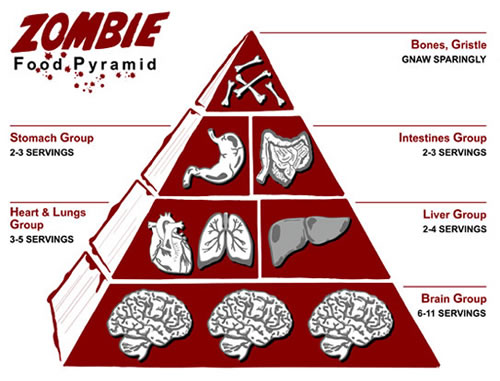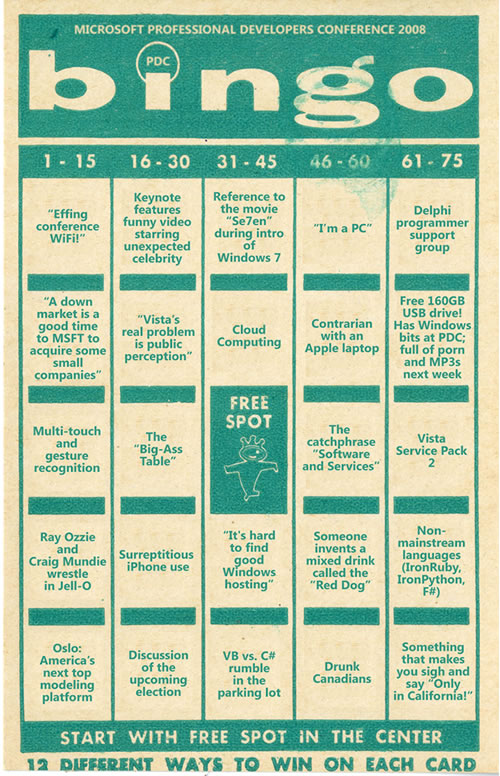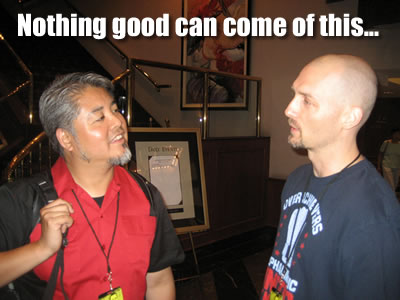 You’ll get way more value out of PDC2008 — the 2008 Microsoft Professional Developers Conference — if you stay healthy. With that in mind, here are some health tips that I’ve picked up in thirteen years of geek conference-going…
You’ll get way more value out of PDC2008 — the 2008 Microsoft Professional Developers Conference — if you stay healthy. With that in mind, here are some health tips that I’ve picked up in thirteen years of geek conference-going…
Wash Your Hands

Logo for Global Handwashing Day, which took place on October 15th.
It applies to everyday life, and doubly so at conferences where you’ve got thousands of people shaking hands and passing around swag, business cards and drinks: washing your hands is the single most effective way to prevent the spread and catching of infections. Do it between sessions or when you have a spare moment, and especially if you’re about to grab a bite to eat.

If for some reason you can’t wash your hands — maybe you’ve staked out a front row seat at one of the Ray Ozzie keynotes and there’s no one to hold your place — you can always opt for a hand sanitizer. Just remember that you’re going to have a slight greasy handshake afterwards.
Get Some Sleep

Many developers have a relationship with sleep that’s reminiscent of many models’ relationship with food: it is both the enemy and a secret shameful love. Models load up on water, eat ice cubes and kleenex and load up on stimulants; developers just load up on stimulants. Consider how caffeine is part of our culture, from giant coffees to energy drinks to Jolt Cola awards to caffeinated soap and lip balm.
When I started taking up busking as a hobby, I came into contact with a lot of homeless people. Sleeping rough on the streets is full of interruptions, so many of them are not only home-deprived, but sleep-deprived. Even when the weather’s good and they’re getting food, they’re still more prone to falling ill. More importantly, lack of sleep does terrible things to their minds, making them increasingly erratic and robbing them of the ability to make good decisions. Some of their most immediate problems can be solved simply by somehow giving them a steady roof over their heads so that they can get a good night’s sleep on a regular basis.
Sleep is important at information-rich conferences like the PDC. A well-rested mind picks up information more quickly and retains more, and that’s at least one of the reasons you (or preferably, your company) shelled out the big bucks to attend. You’ll also do better social networking if you aren’t falling asleep in your beer.
Try to get some decent sleep on at least a couple of the conference nights. If you’re arriving on Sunday, you might want to take it easy on Sunday night so that you can hit Day One of the conference, which includes the first Ray Ozzie keynote, with full force. It would appear that Tuesday night might be the busy night, as that’s when the big attendee party at Universal Studios is happening, so make sure you plan around that.
If you can find a point in the day where none of the sessions are that interesting to you, declare “nap time”, especially if it’s in the long doldrums of the afternoon, when your attention is most prone to wander and the urge to nod off is greatest. Head back to your hotel room, ste the alarm clock and give yourself anywhere from 30 to 90 minutes’ worth of rest, if not outright sleep. You’ll be recharged for the evening, when the human contact part of the conference — the most irreplaceable, irreproducible part — kicks into high gear.
All the sessions are recorded on video with one camera on the speaker and one on the projected slides, so unless you’re dying to have a one-on-one with the speaker or just want to catch the “vibe” of a particularly exciting presentation or keynote, you can always download the video later. It’s the meeting other developers and Microsofties (like me!) part that can’t be downloaded on video or distilled from the presentation slides and notes.
And remember: caffeine is not a sleep replacement! It might keep you going a little bit longer, but you won’t be firing on all cylinders, and it won’t help recharge your immune system like sleep does.
Eat Well

“Let food be your medicine and medicine be your food,” as Hippocrates said. Remember, food isn’t just fuel; it’s also construction material, which means that the best way to stay healthy is to eat healthy.
I have no idea what sort of food will be available at the venue, but it is in Los Angeles, one of the most health-obsessed cities in the most health-obsessed state in the union. It shouldn’t be that hard to find healthy food.
Make sure you try dishes made with local produce. A lot of vegetables are grown right in California, and even the produce at the local big-chain grocery store is better there than most toher places in North America.
Cold-fX is Your Friend

If you’re American, if I say “a pill that prevents colds”, it’s likely that you’d think of Airborne. You’re probably also aware that they recently lost a class-action suit for falsely claiming that it prevents colds. The Center for Science in the Public Interest says that there isn’t any credible evidence that Airborne prevents colds or protects you from germs.
However, if you’re Canadian like me, if I say “a pill that prevents colds”, you’d probably think of Cold-fX. Health Canada, the Canadian equivalent of the American FDA (except that they’re more cautious), has approved their claims that it “helps reduce the frequency, severity and duration of cold and flu symptoms by boosting the immune system.”
It’s pricey — a 60-capsule bottle typically goes for slightly under CDN$30 — but I always take it with me for long flights and conferences. I personally recommend it.
Cold-fX is widely available in Canada, and I think it’s also available in several parts of the U.S..
Boozin’

Scoble and me at South by Southwest 2008, back in March.
Let me cite a passage from my favourite etiquette book, The Modern Gentleman:
Recall the flower of youth, when running on slippery pool decks before hurtling into a cannonball seemed a biological imperative; later in life, wait an extra ten seconds before launching into a graceful swan dive. These boyhood lessons translate into all social behaviors, especially drinking. Be a refined tippler, the part-time, lovable degenerate. Impetuousness ripens into spontaneity, impatience into timely verve, unbridled energy into charisma and elan. Mastering alchohol means picking times to roar, not becoming the nightly wet rag or fun vaccuum. Instead of floundering into slurred oblivion, revel in a sustained buzz of balance and loose chat. Aspire to be “the man that can hold his liqour” as opposed to “that old pathetic drunk”. Get in touch with your chakras and vitality; the venerable vices are not an intrusive competition, but a limbering stretch of control. The ethic of alcohol is about acknowledging personal limits, even as you intentionally step past them.
Since the big Ray Ozzie keynotes are on Monday and Tuesday morning — at eight-freakin’-thirty in the morning — it might be a good idea to go easy on the boozing on Sunday and Monday nights. The big party is on Tuesday night, so be sure to hydrate if you want to catch Microsoft Research’s Rick Rashid’s keynote at 8:30 a.m. on Wednesday.
Oh Yes, the Rumpy-Pumpy

I have two pieces of advice:
- Use protection. If you don’t know why, you shouldn’t be doin’ the rumpy-pumpy.
- If you’re a straight man, do a gender-check. I remember the incident at Def Con 9 in which a guy got “Crying Gamed” in one of the hot tub — the entire thing was caught on video with one of those camcorders with night vision and a ridiculous amount of zoom, and by mid-morning after the unwitting sausage party, everybody had seen it. If you’re a straight guy, you probably don’t want this to happen to you. If you’re not, give him one for me!

















